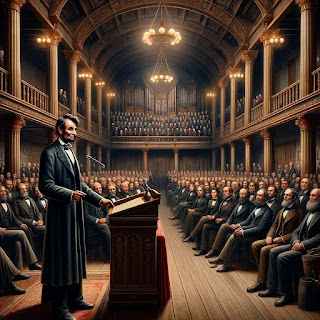The Cooper Union Address: Lincoln's Masterstroke in the Heart of New York
On the cold evening of February 27, 1860, a relatively unknown Abraham Lincoln stepped onto the stage of the Great Hall at the Cooper Union for the Advancement of Science and Art in New York City. This moment, set against the backdrop of a nation teetering on the brink of disunion, would forever alter the course of American history and propel Lincoln toward the presidency.
The Great Hall, an architectural marvel of its time, was packed to the rafters with over 1,500 people. The audience was a mix of curious onlookers, skeptical politicians, and influential intellectuals of the Northeast, many of whom had only heard of Lincoln in passing. The mood was one of anticipation and skepticism. New York was a hub of political power and intellectual discourse, and its residents were not easily swayed by outsider opinions, especially on the contentious issue of slavery.
Standing tall and solitary against the grand backdrop of the Hall's Victorian interior, Lincoln was acutely aware of the skepticism that greeted him. The gaslight illuminated his figure, casting long shadows and a dramatic aura to the evening. His opening words, delivered in a clear and resonant voice, cut through the tension, immediately captivating the audience.
Lincoln's Cooper Union address was a meticulously researched, logically structured argument against the expansion of slavery. He invoked the intentions of the Founding Fathers, demonstrating through historical evidence that the majority believed the federal government had the power to control slavery in the territories. Lincoln's argument was not just a legal or political stance but a moral imperative, delivered with clarity and earnestness that resonated deeply with his audience.
The speech was a masterclass in rhetoric and persuasion. Lincoln anticipated counterarguments and addressed them head-on, weaving moral, legal, and historical threads together into a compelling narrative. His conclusion, a call to "have faith that right makes might," was a powerful appeal to the nation's conscience.
The immediate impact of the speech was profound. The New York Tribune hailed it as "one of the happiest and most convincing political arguments ever made in this City," copies of the speech were widely distributed and read across the North. Lincoln's performance catapulted him from relative obscurity to a leading presidential candidate, demonstrating his ability to articulate a unifying vision for the country.
The Cooper Union address's long-term impact is even more significant. It solidified Lincoln's position as a moderate anti-slavery voice, capable of appealing to a broad spectrum of Northern opinion. It also underscored the power of public speech in shaping political discourse, a lesson that resonates in American politics today.
The Cooper Union speech remains a pivotal moment in American history, a testament to the power of words to change the course of nations. It marked the emergence of Abraham Lincoln as a formidable force in American politics and laid the groundwork for his leadership during the nation's darkest hours. The Great Hall at Cooper Union, now a National Historic Landmark, stands as a monument to this defining moment, reminding us of the enduring power of reasoned argument and moral conviction in pursuing justice and unity.



Comments
Post a Comment